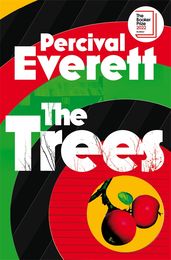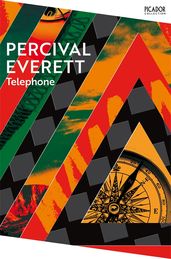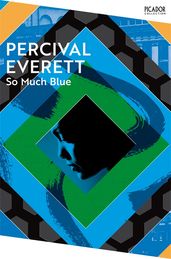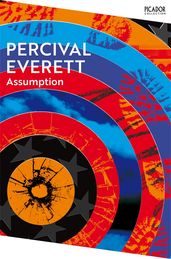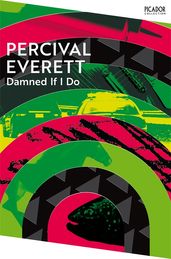Percival Everett's books: from The Trees and Erasure to James
Leah Cowan introduces some of Percival Everett's must-read works, from 2024 Booker-shortlisted James, a radical retelling of Huckleberry Finn, to Booker-nominated The Trees, and Erasure, the novel behind the Oscar-winning film American Fiction.

In a 2002 interview, the prolific novelist Percival Everett explained that “my mission has always been to disappear,” a reference to a concept coined by the French theorist Roland Barthes. In an essay titled ‘The Death of the Author’, Barthes argued that the ‘meaning’ of a book lies in the hands of the reader, and not the head of the writer. Yet, while Everett’s books are certainly mysterious, shape-shifting, metafictional, and full of clever tricks and misdirections, the author’s presence is a beating heart throughout his writing.
Everett’s body of work is significant: to date he has written over twenty novels, a handful of short story collections, a sizeable stack of poetry collections, and a children’s book. His books span a huge range of genres and styles, the author’s experimentation with the boundaries of each a common thread across his works. Through his storytelling, Everett presents unflinching and profound interrogations of race, class and inequality in America, and expansive philosophical questions are laced throughout his stories – evidence of his undergraduate studies and lifelong fascination with the subject. Everett’s writing sings with potent observations on human relationships to others and themselves, and is tempered by his trademark sense of curiosity, satirical wry humour and playfulness.
James
by Percival Everett
In his newest offering, Everett lays out a precise and painful depiction of the Antebellum South on the cusp of Civil War, shot through with his trademark dry humour and semantic flair. The novel is told from the perspective of James (formerly ‘Jim’), the affable companion of Huckleberry Finn in Mark Twain’s eponymous novel. Crucially in Everett’s re-telling, James is resurrected from the graveyard of racist archetypes (in this case, the docile, obedient, noble slave who values his master’s life over his own), and is given multiple dimensions and a character arc of his own: when James embarks on a quest to secure his wife and daughter’s freedom, Huck tags along for the ride.
Dr No
by Percival Everett
One of Everett’s most whimsical, metaphysical, dalliances, Dr No follows the story of a maths professor at Brown University and his three-legged dog who become embroiled in a hair-brained revenge plot to steal ‘nothing’ from the US government, with the ultimate aim of using ‘nothing’ to reduce the country to ‘nothing’. Everett plays with the building blocks of action and heist movies – jet-setting evil villains, under-water shark tanks, and generational grudges – to create a zany, anti-establishment page-turner with a side dish of mathematical conundrums and in-jokes.
The Trees
by Percival Everett
Everett manages to employ a large dose of humor in this satire exploring racial inequality and the brutality of policing in America. Leaning into the murder mystery genre, the story follows a series of murders in Money, Mississippi. Notably, this small town was the site of the lynching of the young Emmett Till sixty-five years prior, and the novel lands us directly in a suburb of Money (“called, unofficially, Small Change”), where an aging Carolyn Bryant whose false accusation sent Till to his death wheels around on her electric buggy. Bringing together traumatic ghosts from the past and placing front and centre the present-day pain of racism in America, The Trees is a powerful commentary on the rot of violence baked into the country’s social structures and institutions.
Telephone
by Percival Everett
Telephone plays with an element that Everett explores across all of his work, to great effect: the concept of perspective. Three, slightly different versions of the novel exist. Small shifts in phrasing and the playing out of events create small ripples in the fabric of each version, leading to three different endings. The story follows the protagonist, a geologist Zach Wells, who is grappling with the reality of his young daughter’s degenerative health condition. Telephone explores the grief of a parent losing grip on a loved one, but without descending into being maudlin – the book is brimful with Everett’s ever-insightful observations on love and loss.
So Much Blue
by Percival Everett
Everett is adept at spinning yarns that carry readers between his characters’ most intimate thoughts, and also journey us across lands and time, and So Much Blue is no exception. The story is told from the perspective of Kevin, a painter, and oscillates between the present day and two emotionally compelling moments from his life: a Parisian love affair, and a madcap mission to El Salvador to try and track down a friend’s brother. The tales are told with Everett’s trademark humour, and this pacy trip down memory lane from the vantage-point of middle age is a gripping story from start to finish.
Percival Everett by Virgil Russell
by Percival Everett
One of Everett’s most esoteric works, Percival Everett by Virgil Russell is a metafictional story about a story, where the realm of reality begins to collapse in on itself. Pulling upon a classic Everettian thread, the novel follows a relationship between a father and son, but attempts to summarise the story beyond this point will fall short: a flurry of stories, settings, and characters proceed to flow from the mind of the narrator, spinning the reader around until we can’t remember how we got there. For those who enjoy finding their way in and out of a tangle, Percival Everett by Virgil Russell is an intriguing literary puzzle.
Assumption
by Percival Everett
The detective novel of Everett’s oeuvre, Assumption lays out a series of unsolved crimes that are being investigated by Deputy Sheriff Ogden Walker in a town in New Mexico. However, readers would do well to remember that Everett likes to play tricks and push the boundaries of genre – this novel layers mysteries upon mysteries, throwing up clues and misdirections as the story unfolds. The novel is sectioned into three cases (Everett seems to enjoy the symmetry of tri-partite storytelling), however as each unfolds, the narrative splits into a kaleidoscope rather than gaining more clarity. In Assumption Everett injects his tell-tale playfulness into a beloved genre, garnishing his own twist on the detective classic.
I Am Not Sydney Poitier
by Percival Everett
This comic yarn is reminiscent of the works of John Steinbeck or Claude McKay, in that the reader follows the protagonist through a rollicking carousel of adventures, each a standalone story in its own right, and in combination producing a fun and frenzied novel that explores the human condition. I Am Not Sydney Poitier follows the life of a person named Not Sydney Poitier, and each chapter is loosely inspired by the films of the real-life Poitier. The novel is a wry and entertaining exploration of race and class in America, laced through with Everett’s characteristic wit and storytelling genius.
Damned If I Do
by Percival Everett
This short story collection demonstrates what Everett does so well: it serves up a series of compelling, vividly-drawn vignettes that pluck characters from across all walks of life in modern-day America, and through giving us access to their lives, tell us something profound about the state of the nation. In Damned If I Do, race is placed squarely in our viewfinder, with characters grappling with what it means to be Black in America. The tales are told with a healthy dose of Everett’s trademark playfulness and absurdity, and a baseline of gallows humour runs throughout. These short gems are crafted with a deft hand, and eschewing tidy endings, the reader is often left piecing together their own conclusions.
Erasure
by Percival Everett
Audiobook narrated by Sean Crisden
Recently adapted into the feature film American Fiction, this satirical thriller follows the story of academic and novelist Thelonius ‘Monk’ Ellison, whose agent is pushing him to write books that are ‘more Black’. The backdrop of the novel is a series of ruptures and complexities in Ellison’s personal life, including the death by suicide of his father, his mother’s worsening Alzheimer’s, and his own divorce alongside his burgeoning queerness. Laid over these complex dynamics is the driving beat of Erasure: a searing indictment of the American publishing industry, in which Black writers are expected to serve up tales of misery and urban poverty to satisfy a white readership.


